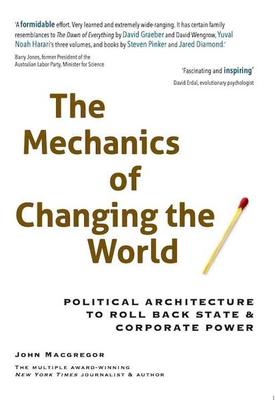Sign up now to get the most out of Books2Read
We're always making new tools to help you discover, save, and share your favorite books.
Sign up now to get updates whenever we release new features!
Discover something great at Books2Read.
We're always making new tools to help you discover, save, and share your favorite books.
Watch your email for exciting announcements and new features coming soon!
Thanks for signing up for Books2Read notifications!
Check your inbox for a confirmation email with instructions to finish signing up.

The Mechanics of Changing the World: Political Architecture to Roll Back State & Corporate Power


John Macgregor

After Propinquity, John Macgregor wrote the treatments (pre-scripts) for the Australian movie Shine; was deported from East Timor at gunpoint while reporting on human rights abuses by the Indonesians; interviewed three prime ministers for the major dailies; won Australia's investigative journalism award for exposing an FBI scandal; and reported from Burma on slave labour under the generals for the New York Times.
John Macgregor was raised in Melbourne, and attended Geelong Grammar School. After school he worked as a jackaroo (cowboy) and a truck driver.
In 1986, Macgregor entered Propinquity in the manuscript section of the Adelaide Festival's Biennial Award for Literature, which it won. In addition to $15,000 in prize money, the award mandated publication by Wakefield Press - which was then owned by the South Australian Government. Propinquity was published to very positive reviews - especially for a first novel. But as it was being released the Press was sold to The Adelaide Review, which had no book-publishing experience. Propinquity sat in the warehouse for many months, and missed the sales bandwagon. A year later Macgregor purchased the rights.
After Propinquity, John Macgregor wrote the treatments for the Australian movie Shine, which was nominated for seven Academy Awards. He also did much research for the movie. In 1989 he worked as a political advisor to Senator Janine Haines, federal leader of the Australian Democrats.
Macgregor reported for The Australian on military intimidation of the East Timorese population, on the anniversary of the Dili Massacre in 1995, and was deported by the Indonesian occupiers.
In the 1980s and 1990s he interviewed Australian Prime Ministers Hawke, Keating and Howard in syndicated profiles with the Age, Sydney Morning Herald and other papers.
In 2001 he wrote a series of articles in the Age and Sydney Morning Herald on the framing of former Florida politician Joe Gersten, by the FBI and Australia's Federal Police. The stories helped secure Gersten Australian citizenship - and Macgregor the 2002 George Munster Award, Australia's prize for investigative journalism.
Macgregor went to live in Southeast Asia in 2004. In 2005 his story and photos on slave labour in Burma were published on the front page of the International Herald Tribune (the foreign edition of the New York Times). He wrote and edited for the BBC World Service Trust also taught as a v...
